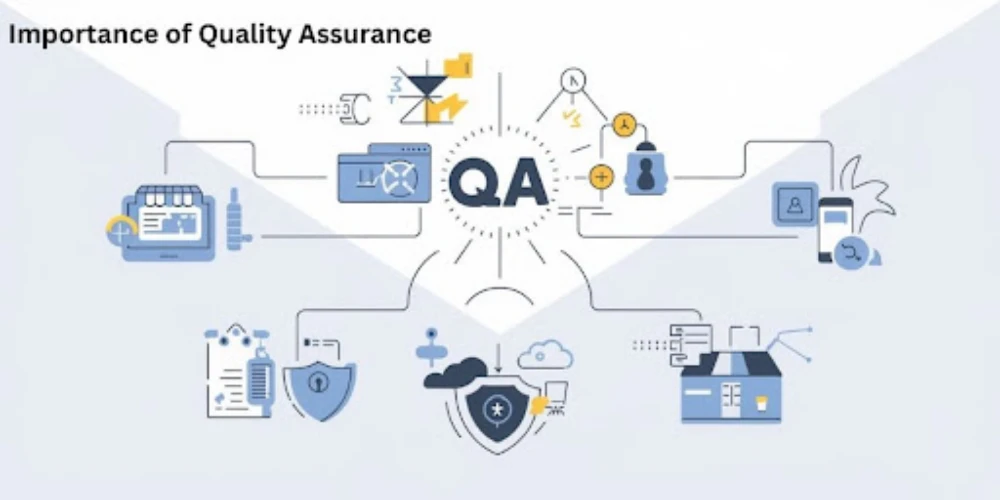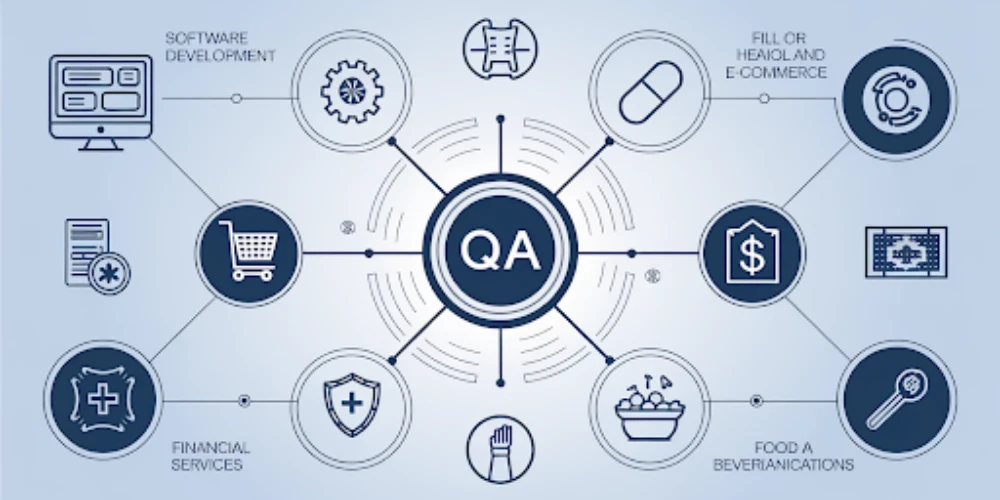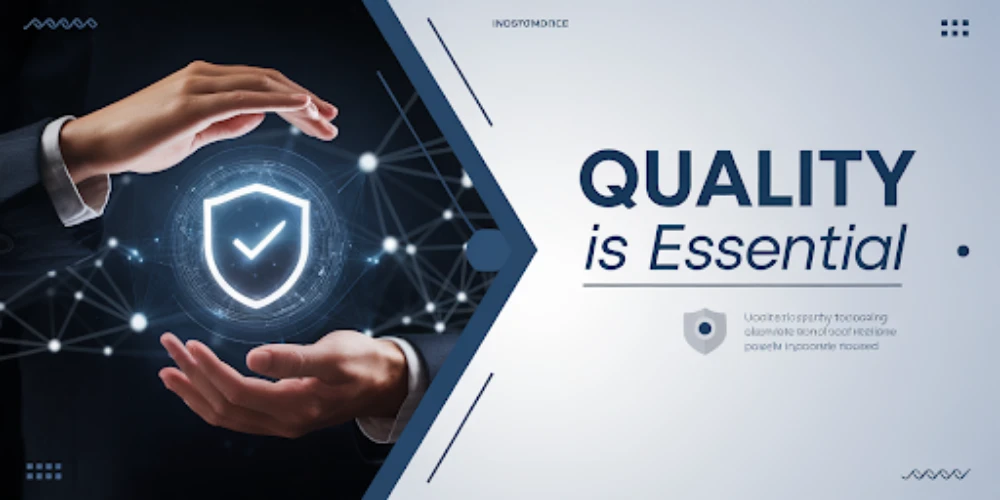QA Stands For: Understanding the Basics of Quality Assurance
The role of a Quality Assurance (QA) Specialist has become indispensable across various industries. From software development to manufacturing, these professionals...
By AMREP | Posted on November 19, 2024

Quality Assurance (QA) is the foundation that ensures everything functions as it should.
Think about it: when you use an app, buy a product, or visit a website, you expect it to work smoothly. You don’t want glitches, crashes, or surprises. That’s where QA steps in. It helps prevent problems before they happen, ensuring a smooth and enjoyable experience for customers. In the long run, strong QA processes build trust, reduce costs, and contribute to lasting success.
In this blog, we'll explore why QA is essential and how it creates value for both businesses and customers.
Quality Assurance is a systematic process aimed at ensuring that products and services meet specific requirements, standards, and customer expectations. It involves continuous testing, monitoring, and improvements throughout the production or service lifecycle. While the specific techniques and tools vary by industry, the core objective remains the same: to deliver consistent quality and prevent defects or issues before they reach the customer.

In the fast-evolving field of software development, ensuring that applications function correctly, securely, and efficiently is paramount. Poorly developed software can lead to crashes, security vulnerabilities, and negative user experiences, which could cost businesses millions in lost revenue, reputation damage, and customer churn.
Here’s why QA is crucial in software development:
A well-tested product improves customer retention and reduces costly post-release fixes.
In manufacturing, even a small defect in a product can lead to significant safety hazards, operational delays, and expensive recalls. Quality Assurance ensures that products meet both regulatory standards and customer expectations, reducing risks and increasing the overall value of the product.
Here’s why QA is crucial in manufacturing:
QA ensures that products are not only safe but also cost-effective, which is vital for maintaining profitability and competitiveness in the market.
In healthcare, the quality of products and services directly impacts patient outcomes. In the pharmaceutical industry, QA is essential for ensuring that drugs and medical devices meet stringent regulatory standards and are safe for public use.
Here’s why QA is crucial in healthcare and pharmaceuticals:
Proper QA in healthcare not only saves lives but also builds trust and credibility with consumers and regulators, essential for long-term success.
In the retail and e-commerce industries, providing a seamless and consistent shopping experience is essential for customer satisfaction. Whether it’s the product quality, user experience on the website, or timely delivery, Quality Assurance ensures that every touchpoint meets customer expectations.
Here’s why QA is crucial in retail and e-commerce:
High-quality products and excellent customer experience lead to improved sales, customer loyalty, and brand reputation.
The financial services industry deals with sensitive data and complex systems that need to operate flawlessly. Any error or system failure can lead to significant financial losses, security breaches, and damage to customer trust. Quality Assurance is vital for maintaining the integrity of financial systems, ensuring that transactions are accurate and secure.
Why QA is crucial in financial services:
In a highly regulated and competitive industry, consistent QA helps build credibility, reduce risk, and maintain customer trust.
In the telecommunications industry, QA ensures that both hardware (such as routers and modems) and software (like mobile apps and networks) operate smoothly. Given the high demand for seamless connectivity, any disruptions or faults in service can lead to customer dissatisfaction and loss of business.
Here’s why QA is crucial in telecommunications:
QA helps build reliable and trustworthy telecommunication systems that retain customers and encourage loyalty.
Food safety and quality are paramount in the food and beverage industry, where consumer health and well-being are at stake. QA processes help ensure that food products are safe for consumption and meet the required nutritional and quality standards.
Here’s why QA is crucial in food and beverage:
A strong QA system in food and beverage prevents health risks and recalls, safeguarding both the company’s reputation and consumer trust.
Read More: The Importance of Quality Assurance in Quality Management
Regardless of the industry, the fundamental benefits of a robust QA process remain the same:

By identifying defects and inefficiencies early, QA reduces the costs associated with rework, recalls, and customer support. Preventing issues upfront is far cheaper than fixing them post-production.
QA ensures that products meet or exceed customer expectations. Consistent quality leads to higher customer satisfaction, loyalty, and positive word-of-mouth.
In highly regulated industries, QA ensures compliance with industry standards and regulations. By following best practices and maintaining a structured QA process, companies can minimize the risk of legal issues, fines, and penalties.
A commitment to quality enhances brand image and trustworthiness. Customers are more likely to buy from companies known for providing reliable and high-quality products.
A solid QA process streamlines workflows, reduces waste, and optimizes resource allocation, improving the overall efficiency of operations.
Read More: Choosing the Best QA Management Partner: Trends and Services
At AMREP Inspect, we are dedicated to providing comprehensive QA solutions that ensure your products and services meet the highest standards. With our expert Quality Inspection Services, you can trust that every detail is taken care of, giving you the confidence to deliver top-quality results every time.
Partner with AMREP Inspect and experience the difference that quality makes. Your success is built on our commitment to excellence.
Contact Us To See What We Can Do
Call Us
Mon - Sat 9.00 - 18.00
Sunday Closed


23 - October 2024
23
October
2024
The role of a Quality Assurance (QA) Specialist has become indispensable across various industries. From software development to manufacturing, these professionals...

21 - October 2024
21
October
2024
Every interaction shapes customer perceptions. So, quality assurance (QA) has become the backbone of successful organizations. It’s not just about checking boxes; it’s about...

14 - October 2024
14
October
2024
When consumer expectations are higher, maintaining quality is not just an option—it's a necessity. Quality assurance (QA) methods are the backbone of successful...
